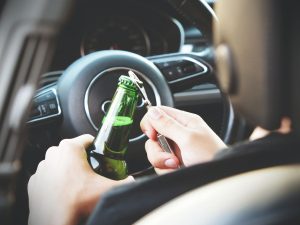Among the many potential consequences of excessive drinking, one of the most common is driving while intoxicated (DWI). In the United States, DWIs are a serious criminal offense that can result in severe legal penalties.
And recently, incidents have been on the rise– according to the National Highway Traffic Safety Administration, in 2021, there were 13,384 deaths in incidents involving alcohol-impaired driving. With such a high potential for causing harm, authorities can impose heavy penalties on those found guilty of a DWI charge.
If you’ve been convicted of a DWI, you may be wondering what to expect next. In this comprehensive guide, we’ll break down the legal process and outline possible penalties and steps you can take in order to move forward.
Therefore, understanding the legal process, penalties, and crucial steps to take following a DWI arrest is essential in ensuring a safer and more responsible approach to alcohol consumption.
What is a DWI?
A DWI is a grave offense in which an individual operates a vehicle while their normal faculties are impaired due to the influence of alcohol or drugs. This offense is taken seriously as it jeopardizes road safety and poses a significant risk to others.
With a breathalyzer or blood test, law enforcement agents can detect a person’s blood alcohol concentration (BAC) and determine whether they are legally impaired. In most states, a BAC of 0.08% or higher is considered legally intoxicated. Such an offense is punishable by serious penalties, which can reflect poorly on one’s driving record, criminal records, and career.
What Is the Difference Between DUI and DWI?
While some states use the terms interchangeably, they can have distinct meanings. DUI, or Driving Under the Influence, generally refers to operating a vehicle while impaired by alcohol or drugs, even if the BAC is below the legal limit. The prevalence of DUI is alarmingly high, with approximately 1 million arrests per year in the U.S. attributed to alcohol or drug-related incidents.
To find out whether your state uses DUI and DWI interchangeably, consult your local DMV by visiting their website. For example, if you’re in New York, you can see the NYC DMV website to find out more about DWI laws within its jurisdictions.
What is the immediate consequence of a DWI Arrest?
Photo by Kindel Media
The immediate consequence of a DWI arrest can be pretty overwhelming. Upon arrest, the driver may face immediate suspension of their driver’s license, leaving them unable to legally drive until the case is resolved. Depending on the jurisdiction and severity of the offense, as well as a history of similar offenses,the driver might also be required to spend time in jail or face hefty fines.
Additionally, there could be mandatory attendance at alcohol education programs or community service. Seeking legal counsel and understanding the process ahead becomes crucial to navigate through this challenging situation.
What Happens at the Initial Screening After a DWI?
At the initial screening after a DWI, the arrested individual will undergo a series of assessments. The process typically involves a thorough evaluation of their sobriety level and a review of any medical or alcohol-related issues. The screening may include field sobriety tests, breathalyzers, or blood tests to determine the BAC.
Based on these results and the severity of the offense, the authorities will decide whether the person should be released on bail or held in custody. It’s a crucial step in the legal process that sets the tone for what lies ahead after a DWI arrest.
What Happens in Court After a DWI?
Once in court, the individual will face charges related to their DWI offense. The proceedings begin with the arraignment, where the charges are formally presented, and the accused enters their plea – guilty, not guilty, or no contest. If the appeal is not guilty, the case moves to the pre-trial phase, during which the defense and prosecution exchange evidence and negotiate possible plea bargains.
If no plea agreement is reached, the case proceeds to trial. At trial, both sides present their evidence, witnesses are called, and the judge or jury determines guilt or innocence. If found guilty, sentencing follows, and penalties may include fines, probation, license suspension, mandatory alcohol education programs, or even jail time, depending on the severity of the offense and the jurisdiction.
For some, the court may offer alternatives such as diversion programs, which, if completed successfully, could lead to a reduction of charges or dismissal. It’s essential to have legal representation during this process to ensure rights are protected and to explore the best possible outcome.
After sentencing, there may be opportunities for an appeal or to seek conditional driving privileges. However, it’s crucial to understand that a DWI can have far-reaching consequences on one’s personal and professional life, making responsible drinking and avoiding impaired driving paramount for public safety and individual well-being.
Photo by Sora Shimazaki:
What Happens to Your License After a DWI Arrest?
After a DWI arrest, the fate of your driver’s license hangs in the balance. The DWI arrest process triggers a series of administrative and legal actions that can lead to license suspension or revocation. Initially, your license might be confiscated on the spot, and you could receive a temporary driving permit that allows you to drive for a limited period, usually 30 days.
Next, you’ll face a DMV administrative hearing, where the officer will present evidence to determine if your license should be suspended. If you don’t request this hearing within a specific timeframe, your license could automatically be suspended.
Depending on the outcome of the administrative hearing, your license may be suspended for a designated period, typically ranging from several months to a year. In some cases, you may be eligible for a restricted or hardship license that permits driving to work or other essential activities.
During the court process, if you’re convicted of a DWI, the court may impose additional license-related penalties. In certain states, a mandatory license suspension is enforced upon conviction, and you may be required to complete an alcohol education or treatment program before reinstating your license.
How To Seek Legal Help From a DWI Attorney
If you find yourself facing a DWI charge, seeking legal help from a DWI attorney is crucial. Start by researching experienced attorneys who specialize in DWI cases. You can use Google’s local search to find reputable DWI attorneys in your area.
Reach out to them for a consultation to discuss your situation and understand your options. During the meeting, ask about their experience, success rate, and how they plan to handle your case. Be open and honest about the details of your arrest. Based on this information, the attorney will advise you on potential strategies, potential outcomes, and the best way forward.
Working with a skilled DWI attorney can make a significant difference in navigating the legal process and achieving the best possible outcome for your case.
How Can a Legal Representative Help You?
A legal representative can be your saving grace during DWI legal proceedings. They possess expertise in navigating the complex legal system and understanding the intricacies of DWI laws. They will evaluate your case, gather evidence, and build a strong defense strategy tailored to your situation. Their negotiation skills may lead to reduced charges or plea bargains.
In court, they’ll advocate for your rights, challenge evidence, and cross-examine witnesses. With their guidance, you’ll be informed of your options, potential outcomes, and the best course of action. Having a skilled legal representative by your side can provide peace of mind and significantly improve your chances of achieving a favorable result in your DWI case.
Alcohol Treatment and DUI School
Alcohol treatment and DUI school play crucial roles in addressing the aftermath of a DUI or DWI offense. These programs aim to educate, rehabilitate, and prevent future incidents.
Alcohol treatment programs are designed to help individuals struggling with alcohol abuse or dependency. They offer various levels of care, from outpatient counseling to inpatient rehabilitation, depending on the severity of the alcohol-related issues. These programs focus on understanding the root causes of alcohol misuse, providing coping strategies, and offering support to achieve sobriety and lead a healthier life.
On the other hand, DUI school, also known as DWI education programs, caters specifically to those convicted of DUI or DWI offenses. These courses usually span several weeks and provide comprehensive education about the dangers of impaired driving, the legal consequences of such actions, and ways to make responsible decisions when it comes to alcohol consumption and driving.
Participating in these programs may be a requirement to reinstate a suspended license or satisfy court-ordered mandates. Additionally, completion of alcohol treatment or DUI school might lead to reduced penalties or dismissed charges in some cases.
What Is an Ignition Interlock Device and How It May Be Required After a DWI?
An Ignition Interlock Device (IID) is a small breathalyzer installed in a vehicle that measures the driver’s BAC before allowing the engine to start. If the driver’s BAC exceeds a preset limit (usually 0.02% to 0.04%), the IID prevents the vehicle from starting. It acts as a preventive measure to deter individuals from driving while intoxicated after a DWI offense.
After a DWI, many states require offenders to install an IID in their vehicle as a condition for reinstating their driving privileges. The length of time the IID is required varies depending on the severity of the offense and the state’s laws. Typically, first-time offenders face a shorter IID requirement compared to repeat offenders.
Having an IID can be a significant inconvenience, as drivers must blow into the device every time they want to start their vehicle and sometimes during their journey as random retests. However, it’s a crucial safety measure that can save lives and prevent future DWI incidents.
Moreover, IID data is often monitored and reported to the authorities, so attempting to tamper with or bypass the device can result in legal consequences or extend the IID requirement period. While an IID may seem burdensome, it can also serve as a reminder and an opportunity for individuals to reflect on their actions and make responsible choices when it comes to alcohol consumption and driving.
Dealing with Insurance After a DWI
Photo by Andrea Piacquadio
Many insurance companies view DWI offenses as high-risk behavior, and as a result, they may either raise premiums significantly or even cancel the policy altogether. Finding affordable coverage post-DWI can be challenging, and some individuals may be required to obtain SR-22 insurance, a particular type of high-risk coverage.
It’s essential to shop around and compare quotes from various insurers to get the best possible rates. You can do so by getting quotes from online services, visiting a local insurance office, or working with an independent agent who specializes in high-risk policies.
While insurance costs may increase, maintaining coverage is crucial for staying compliant with the law and protecting oneself and others on the road.
Frequently Asked Questions
What Happens if You Drive After a DWI?
Driving after a DWI can lead to severe consequences, such as additional charges, extended license suspension, higher fines, and possible imprisonment.
What Happens When Police Take Your Firearm After a DWI Wreck?
When police take your firearm after a DWI wreck, it’s likely for safekeeping during the investigation or due to potential concerns about your ability to possess a gun responsibly.
What Happens if the Officer Gives the License Back After a DWI?
If the officer gives the license back after a DWI, it could mean a temporary release, but the case is not necessarily closed. Legal proceedings and potential penalties may still follow.
What Happens When You Get Your License Back After 30 Days for a DWI?
After 30 days for a DWI, getting your license back usually means your suspension period is over. However, you may still face restrictions and legal consequences pending the outcome of your case.

